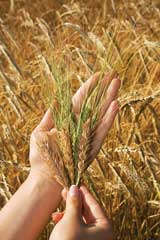|
|
|||
|
|
|
||
|
|
No one works more closely with nature than farmers. Organic farmers in particular have a deep appreciation for and seek to understand nature’s life-sustaining processes, aiming to work in harmony with them to produce healthy food. They possess a long-term perspective, wanting to produce a positive, lasting impact on the environment, communities, and human health for future generations. As they culture food crops, organic farmers culture within themselves a down-to-earth sensibility along with a spiritual perspective about nature’s greater intelligence. Organic agriculture, also known as “regenerative,” “biological,” or “ecological” agriculture, falls under the larger category of sustainable agriculture, which aims to produce food in a way that will “sustain” natural resources and human life for future generations. Sustainable agriculture practices cover a broad spectrum, ranging from low-input, reduced-chemical and chemical-free practices to organic and biodynamic agriculture. The latter system combines traditional organic farming techniques with practices that seek to adapt a farm to natural rhythms of the sun and moon and to increase the vital life force or energy described in mystical traditions. Organic farming is considered by many to be a new alternative to so-called conventional farming. In reality, organic is the oldest system of farming in the world, while chemical-based industrial farming has developed over the last 50 years. Most important, modern organic agriculture is not a return to the past but a synthesis of tried-and-true and innovative agricultural practices. The result is an efficient, economically viable, and sustainable system to produce healthy food. While employing age-old techniques, such as crop rotations and composting, organic farmers readily adopt new technologies and techniques, such as more efficient tools and machinery and new crop varieties, ever seeking ways to improve production. Innovation is key to organic farming, even if the new solutions sometimes fail. According to David Vetter, who has been growing organic grain for more than 30 years and is owner of Grain Place Foods in Marquette, Nebraska: “If you’re going to be an organic farmer, you have to be willing to make big mistakes by the highway where everyone can see.” While industrial farmers feed plants chemical fertilizers to stimulate plant growth, organic farmers feed the soil. They apply compost made from decaying organic matter and manure, a valuable fertilizer, to build humus, which is vital to create good soil structure and enhance biological activity. Organic farmers plant cover crops and green manures, such as alfalfa and clover, to prevent soil erosion, reduce weeds, and provide nitrogen. The National Organic Standards Board’s definition of organic further states that organic “is based on minimal use of off-farm inputs and on management practices that restore, maintain and enhance ecological harmony.” Industrial farming relies heavily on crop monocultures, plantings of a single crop such as corn, soybeans, or wheat, on hundreds or thousands of acres. Monocultures are vulnerable to pests and disease, require large amounts of chemical pesticides and fertilizers to sustain them, and cause soils to erode. Organic farms are more diverse. Diversity provides more ways to protect the crops from pests and drought and reduces financial risk that can result from a crop failure. Critics say organic agriculture cannot produce the high crop yields needed to feed an expanding world population. Not true! Research shows organic production matches or exceeds that of industrial agriculture. A study published in Nature compared conventional and organic apple production in Washington over a six-year period and found that the organic system produced better soil quality, comparable yields to conventional farming, higher profits, greater energy efficiency, and firmer, better-tasting apples. A long-term study at the University of California at Davis found that yields of organic tomato, safflower, corn, and beans equaled and, in some cases, exceeded conventional varieties. Excerpted with permission from The Organic Food Handbook ©2006 by Ken Roseboro, published by Basic Health Publications, Inc., Laguna Beach, CA. Available in stores or visit www.basichealthpub.com.  Natural Quit Smoking Program
recommended by The Share Guide: learn more Natural Quit Smoking Program
recommended by The Share Guide: learn moreMORE
HEALTH ARTICLES Home Health Store |
||
|
|
|||
|
|
|
||



 If
you liked this article, you'll
love The Share Guide's
If
you liked this article, you'll
love The Share Guide's